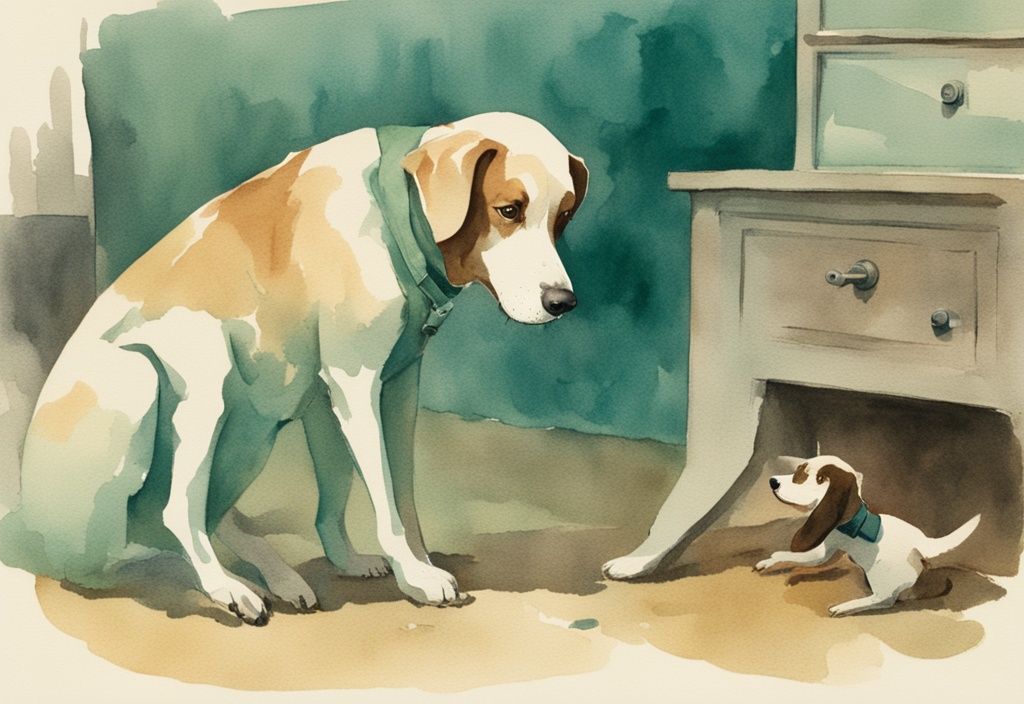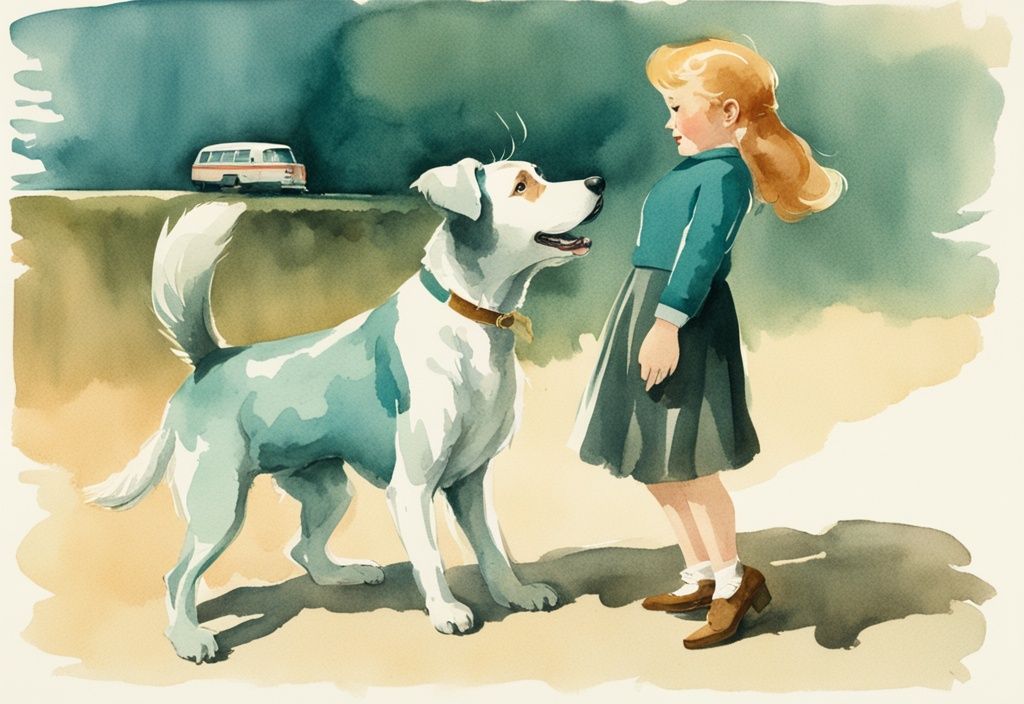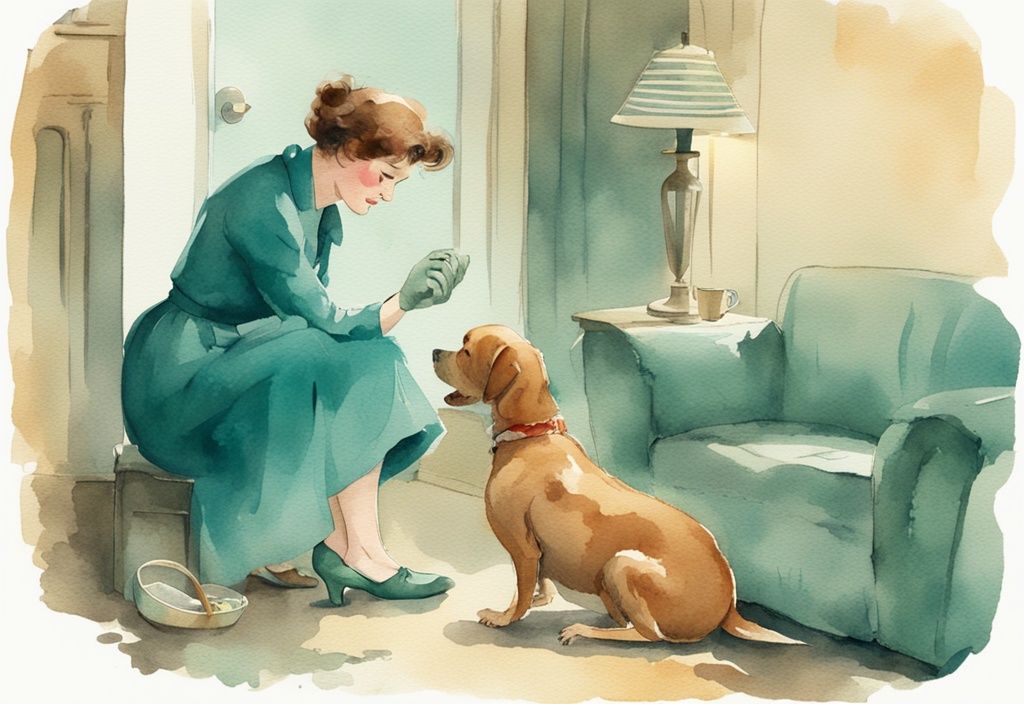Have you recently noticed your beloved pooch shaking and acting strangely all of a sudden? As a fellow dog lover, I understand how distressing it can be to witness your furry friend in such a state. Is it anxiety, injury, or perhaps something more serious?
Allow me to guide you through the process of uncovering the root causes of this unnerving behaviour and how you can help. I’ll be sharing from a detailed rundown of symptoms to practical and immediate steps you need to take.
Let’s get started on ensuring the well-being of our animal companions together, hopefully bringing back those wagging tails and playful barks that we all cherish.
Understanding Your Dog’s Unusual Behavior
Sometimes, our furry friends start behaving out of the ordinary, leaving us puzzled and concerned. This section dives into some common reasons behind your dog’s sudden shaking and odd behavior, helping you get a better grasp on what might be going on.
Common Causes for Shaking and Acting Weird
Anxiety and Stress
Seeing your beloved pet shaking and acting weird all of a sudden can be heart-wrenching. Anxiety and stress are often at the root of these behaviors. Have you recently moved to a new home or rearranged your furniture? Such changes can seriously unsettle your dog. Thunderstorms and fireworks are well-known stress triggers. Our canine pals also suffer from separation anxiety if left alone too long.
Unfamiliar situations, whether a trip to the vet or meeting new people or pets, can cause significant distress. Watch for signs like pacing, panting, or drooling. Your dog might hide or tremble, seeking comfort close to you. In severe cases, you might see destructive behavior, excessive barking, or whining. Recognizing these symptoms early can help you address the root cause and provide the comfort your furry friend needs.
Pain and Discomfort
Another reason your dog might be shaking and acting oddly all of a sudden is pain and discomfort. Injuries, arthritis, dental problems, or internal issues like pancreatitis could be to blame. Dogs are experts at hiding pain, but some signs give it away. Look for limping, vocalizing, or avoiding specific movements. Notice any changes in eating or sleeping patterns? These can be red flags. Close monitoring and a veterinary consultation are vital for a thorough examination and effective pain management plan.
Generalized Tremor Syndrome (GTS)
Generalized Tremor Syndrome (GTS), also known as “White Shaker Dog Syndrome,” might explain your dog’s shaking and bizarre behavior. This condition leads to full-body tremors and is more common in small breeds. A veterinary diagnosis is essential to confirm GTS. Usually, treatment involves medications prescribed by your vet to manage the tremors. Early diagnosis and proper treatment can greatly improve your dog’s quality of life.
Sudden Changes in Behavior: Key Causes
Poisoning and Toxicity
Has your dog suddenly started shaking and acting weird all of a sudden? Poisoning might be the culprit. Dogs are naturally curious explorers, often inspecting the world with their mouths. Sadly, many everyday household items can turn this innocent curiosity into a dangerous situation. Items like chocolate, xylitol (found in sugar-free gum), grapes, antifreeze, select houseplants, and various household chemicals can be highly toxic to dogs. Symptoms of poisoning include vomiting, diarrhea, disorientation, seizures, and lethargy. If your fur baby is showing any of these signs, swift veterinary attention is crucial to avoid severe complications.
Canine Distemper
Yet another alarming reason for sudden shaking and unusual behavior in dogs could be Canine Distemper. This viral illness is highly infectious and potentially fatal, predominantly affecting dogs that haven’t been vaccinated. The symptoms are pretty distressing and include shaking, coughing, nasal discharge, vomiting, and seizures. The severity of Canine Distemper underlines the importance of timely vaccinations. Should you suspect your dog might have distemper, immediate veterinary care is essential to manage the symptoms and stop the disease from advancing.
Seizures and Epilepsy
Seizures and epilepsy are also major contributors to sudden, strange behaviors in dogs. Episodes can be quite frightening and usually involve uncontrollable shaking, drooling, muscle twitching, and sometimes temporary loss of consciousness. If your dog is shaking and acting weird all of a sudden, it might be experiencing a seizure. Epileptic episodes can range in frequency and severity. Though they are alarming, many dogs with epilepsy can still lead happy lives with the correct medical management. Your veterinarian can offer a diagnosis and treatment options for managing this condition effectively.
Cold Temperatures
Don’t overlook the weather! Smaller dog breeds or those with thinner coats are more susceptible to cold temperatures, which can cause them to shake and act strangely as they try to retain body heat. Prolonged exposure to the cold can lead to hypothermia, which is a serious condition needing immediate attention. If you notice your furry friend is shivering or behaving unusually in colder weather, ensure they are kept warm with blankets, appropriate clothing like dog coats, and shifting them to a warmer environment promptly. Recognizing these factors can help you take quick action, ensuring your beloved pet stays comfortable and healthy.

Decoding the Signs and Symptoms
Understanding what’s going on with your furry friend can be a puzzle, but it’s one worth solving. Let’s dive into some common reasons why your dog might be shaking and acting weird all of a sudden.
Identifying Anxiety and Stress Triggers
Wondering, “Why is my dog shaking and acting weird all of a sudden?”—anxiety and stress often emerge as the primary culprits. Dogs are sensitive creatures; sudden environmental changes, loud noises, or separation from you can provoke significant anxiety. Have there been recent changes at home, like moving to a new place, the arrival of new family members or pets, or even construction noise?
Look for common anxiety behaviors like pacing, seeking constant comfort from humans, and excessive barking or whining. Creating a calm and secure environment helps alleviate these stressors, and for more insights on helping your dog cope with anxiety, check out this resource on anxious behavior in dogs. Cozy spaces, familiar objects, and a lot of love can work wonders. In severe cases, you might want to explore how to euthanize a dog with over the counter drugs as a last resort.
Recognizing Pain and Discomfort
Pain could be the sneaky culprit if your dog is shaking and acting weird all of a sudden. If they’re limping, vocalizing when touched, or shying away from movements that might hurt, pain might be at play. Watch for changes in eating or sleeping patterns; they can hint at issues like arthritis, dental problems, or internal conditions.
Observing your dog’s movements and behaviors carefully, combined with a timely vet visit, can help identify and manage pain effectively. Remember, catching these signs early can make a world of difference.
Symptoms of Seizures and Epilepsy
One of the most alarming reasons for sudden shaking could be seizures. It’s truly distressing to see your dog go through an epileptic episode characterized by uncontrollable shaking, drooling, muscle twitching, and possibly loss of consciousness.
Clear away sharp objects to keep your dog safe and seek immediate veterinary assistance. Consistent monitoring and appropriate medication can help manage epilepsy, reducing both the frequency and severity of seizures. It’s about providing them with the safest environment possible.
Preventing Cold Related Problems
Don’t forget the weather! Cold temperatures can seriously affect your dog’s well-being, especially if they’re a smaller breed or have a thin coat. If your pooch is shaking and acting weird all of a sudden, they might be cold. Provide them with cozy blankets and coats and move them to a warmer spot if needed.
Watch out for signs of hypothermia—severe chills, lethargy, and weakness. Being proactive about keeping your dog warm, especially during the colder months, helps prevent these cold-related issues. Stay vigilant and snuggle up!
Handling Your Dog’s Condition: What to Do?
Creating a calm environment is essential when your dog is shaking and acting weird all of a sudden. Here are tailored approaches to address anxiety, pain, and seizures in your furry friend.
Dog Shaking Because of Anxiety/Stress: Steps to Take
Creating a calming environment is crucial when your dog is shaking and acting weird all of a sudden. Identify a quiet corner in your home where your dog feels safe and comforted. Introduce soft bedding, dim lighting, and perhaps a favorite toy to help them relax.
Moreover, consult a veterinarian to discuss potential behavioral training or medication options that could alleviate anxiety. Employ desensitization and positive reinforcement techniques consistently to reduce stress triggers over time. Through patience and targeted strategies, you can help manage your dog’s stress and anxiety efficiently.
Dealing with Pain and Discomfort
When dealing with a dog shaking and acting weird all of a sudden, it’s important to systematically ascertain the source of their pain. Observe their movements closely, noting any limping, avoidance of certain actions, or vocalizations indicating discomfort.
Avoid touching or manipulating injured areas to prevent exacerbating the pain. Promptly schedule an appointment with your veterinarian for a thorough examination. A vet can determine the cause of the pain and prescribe appropriate pain management solutions, ensuring your dog can return to a state of comfort as quickly as possible.
Actions to Take During Seizures and Epilepsy
If your dog starts shaking uncontrollably and acting weird all of a sudden, it could be a sign of a seizure. Ensure your dog’s safety by quickly removing any sharp or potentially dangerous objects from their vicinity.
Do not attempt to restrain your dog during a seizure, as this can cause injury to both you and your pet. Remain calm and monitor the duration and symptoms exhibited during the seizure. Once it subsides, contact your vet immediately for further assessment and to discuss potential treatment plans.
Proper post-seizure care is essential for managing seizures and epilepsy in dogs.

Emergency Protocol: When to Contact a Vet?
When it comes to our furry friends, knowing when to contact a vet can make all the difference. From spotting persistent or severe symptoms to taking immediate steps during emergency situations, understanding these protocols ensures your dog gets the necessary care right when it’s needed.
Spotting Persistent or Severe Symptoms
When your dog is shaking and acting weird all of a sudden, it’s crucial to keep a close eye on them. If the shaking comes with vomiting, diarrhea, or seizures, this might be a sign of something serious. Persistent shaking, especially if it lasts more than a few minutes or happens often, is also a red flag.
Moreover, if you notice any visible injuries, signs of pain, like limping or vocalizing, it’s time to consult your vet. Accidents happen, and sometimes dogs get into things they shouldn’t. If you think your dog might have ingested something toxic—like household chemicals, medication, or certain plants—don’t wait. Seek help immediately.
Additionally, sudden shaking mixed with unusual behavior, such as extreme lethargy, confusion, or disorientation, can indicate an urgent health issue. Having a vet evaluate your pet promptly is essential.
Steps to Take During Emergency Situations
If your dog is shaking and acting weird all of a sudden, acting quickly is vital. Suspect poisoning? Contact your vet or the Pet Poison Helpline right away. Keep details of any substances your dog might have ingested handy to help the vet determine the best course of action.
In emergency situations like hypothermia, where cold exposure has affected your dog, gently warming them with blankets and moving them to a warmer environment is crucial. While doing so, reach out to your vet simultaneously.
Creating a controlled environment for your dog, minimizing stress or additional injuries, is key. Until you can get professional help, prioritize your pet’s safety and comfort.
Remember, your swift and calm actions can keep your furry friend safe until they get the professional care they need.
Preventive Measures to Improve Your Dog’s Health
Benefits of Regular Vet Visits
Regular veterinary check-ups are absolutely essential for catching potential health issues early on in your dog. These visits mean routine vaccinations, thorough health evaluations, and the prevention of common diseases. It’s also the perfect time to chat with your vet about your dog’s diet, exercise routine, and day-to-day life.
Proactive care is key to addressing any concerns right away, stopping them from becoming bigger issues down the line. This is particularly critical if you’re suddenly thinking, “Why is my dog shaking and acting weird all of a sudden?” A vet’s early intervention can offer peace of mind and effective solutions.
Nurturing a Safe Home Environment
Creating a safe home environment for your dog is a fundamental part of their overall well-being. Start by making sure your home is free from toxic substances like harmful plants, chemicals, and foods that could cause serious harm if ingested. This is crucial, especially if you’ve noticed that your dog is shaking and acting weird all of a sudden; poisoning might be the cause.
Additionally, ensure your dog has a quiet space to retreat to—somewhere they can feel safe and secure. Reduced stress and anxiety can significantly improve their overall health.
Early socialization and training are also vital to prevent unusual behavioral issues. By fostering a stable, nurturing home, you can create an environment that enhances your dog’s physical health and emotional well-being.
Understanding Veterinary Diagnostics
Noticing that my dog is shaking and acting weird all of a sudden can be alarming and confusing. Veterinary diagnostics play a vital role in unraveling these sudden behavioral changes in our furry friends.
The Importance of Physical Examination & Diagnostic Tests
When your dog starts exhibiting concerning symptoms, the first step is always a thorough physical examination by a caring veterinarian. This exam is like a comprehensive check-up where the vet closely watches your dog’s physical condition, movements, and reactions. They’re looking for any signs or clues that might explain why your pup is acting out of sorts.
In addition to the physical exam, diagnostic tests are the backbone of identifying health issues. One of the most common tests is bloodwork, which helps to evaluate how well your dog’s organs are functioning, spot infections, and uncover any hidden health problems. Bloodwork can tell you so much about your dog’s internal health.

Imaging tests like X-rays or ultrasounds are also frequently used. These tests offer a peek inside your dog’s body, showing detailed images of organs and bones. This can be super important for finding things like fractures, tumors, or any abnormal growths that might be causing discomfort.
Don’t forget about urine tests! These provide valuable insights into your dog’s urinary tract health. They can detect infections or kidney issues that might be affecting your dog’s behavior. Sometimes, specific condition tests are needed. For example, if there’s a concern about your dog’s brain or nervous system, the vet might suggest an MRI or CT scan. This helps get a clear picture of what’s going on inside your dog’s head.
All these tests, combined with the vet’s keen observations during the physical exam, help to piece together the puzzle of why my dog is shaking and acting weird all of a sudden. This comprehensive approach ensures that your beloved canine gets the right treatment plan, bringing them comfort and keeping that tail wagging.
Effective Treatment Options for Your Dog’s Condition
When my dog is shaking and acting weird all of a sudden, it’s crucial to pinpoint the cause and seek effective treatment options. From pain management and medications for neurological disorders to behavioral modification, there are several ways to help your furry friend feel better again.
Pain Management
Pain might be the reason why your dog is shaking and acting weird all of a sudden. Effective pain management starts with finding the source of the discomfort. Imagine your pup’s relief after a thorough veterinary examination uncovers the real issue! Medications like non-steroidal anti-inflammatory drugs (NSAIDs) are often prescribed to ease pain and inflammation. In more severe cases, stronger pain relievers or opioid medications might be necessary. Some conditions, such as arthritis or injuries, may even require interventions like physical therapy, acupuncture, or surgical procedures. Always consult your vet for the right treatment and dosage tailored to your dog’s specific needs. Remember, the goal is to bring back your dog’s wagging tail and playful spirit!
Medication for Neurological Disorders
Neurological issues could be behind the sudden shaking and weird behavior in your dog. Conditions like seizures and epilepsy often require specialized treatment with anticonvulsant medications. These drugs help control and reduce the frequency of seizure episodes. For pet owners looking to manage their dog’s health comprehensively, finding the right tools for routine care can be essential. Check out our guide on the 10 best dog nail clippers to ensure your pet’s grooming needs are also met. It’s vital to have continuous monitoring by a veterinarian to assess the effectiveness of the medication and make necessary adjustments. Alongside medication, routine check-ups and diagnostic tests like blood work ensure your dog’s overall health isn’t adversely affected by long-term medication use. Quick and appropriate intervention can significantly enhance your dog’s quality of life, letting them enjoy their days with you once more.
Behavioral Modification
Sometimes, shaking and odd behavior in your dog stem from anxiety or stress. Behavioral modification techniques can be incredibly effective in these cases. Desensitization involves gradually exposing your dog to anxiety-inducing stimuli at a controlled pace, helping them become less reactive over time. Positive reinforcement, like rewarding calm behavior with treats or praise, further strengthens desired behaviors. Don’t underestimate the power of environmental changes; creating a quiet, comfortable space where your dog feels safe can make a world of difference. If anxiety or stress persists, consider seeking help from a professional animal behaviorist who can develop a customized plan to address and modify your dog’s behavior. The bond you share with your dog will grow even stronger as you work through these challenges together.
FAQ
What should I do if my dog is shaking, behaving weird, and vomiting?
If your dog is shaking and acting weird all of a sudden, especially if it’s accompanied by vomiting, it’s crucial to contact a vet immediately. Share any recent dietary changes or potential toxin exposures with the vet. They will guide you on what preliminary steps you can take before visiting to make sure your furry friend gets prompt and effective treatment.
Is it normal for my dog to shake when excited?
Absolutely! When dogs are excited or happy, shaking is pretty normal. You might notice those adorable full-body wiggles. This kind of shaking is usually short-lived and paired with playful behavior, showing just how thrilled and enthusiastic your dog is.
When should shaking and unusual behavior be a cause for concern?
Persistent or severe shaking shouldn’t be ignored. If it comes with symptoms like vomiting, lethargy, seizures, or pain, there might be underlying issues. It’s also a red flag if your dog starts shaking after ingesting something toxic or following an injury. In these cases, immediate veterinary attention is a must.
What are the signs of poisoning in dogs?
Signs of poisoning can really vary but commonly include vomiting, diarrhea, disorientation, seizures, drooling, and lethargy. If you suspect your dog has been poisoned, contact a vet or the Pet Poison Helpline right away. They can provide urgent care and specific instructions to help your dog.
